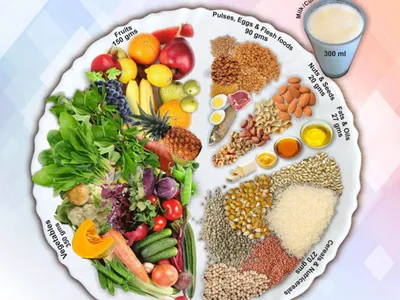“When discussing nutrition, we are essentially talking about nutrients. As we all know, the nutritional requirements vary for each individual. People consume different nutrients in different amounts, resulting in an overall impact on an individual’s health and physiological condition.
People residing in various geographical conditions, different environments, states, countries, and communities consume different varieties of food. Additionally, the availability of food varies, leading to issues such as goiter and Iodine Deficiency Disorder. Similarly, different areas and populations may experience different nutritional deficiencies.
Nutrition provides energy to the body to perform various functions. As we age, our energy requirements change. The highest energy demands occur during growth periods, such as infancy, puberty, and pregnancy, where the body undergoes physiological changes requiring macro and micronutrients for growth. Insufficient vitamins and minerals can lead to temporary and permanent growth abnormalities.
The fundamental nutrients forming the basis of Indian traditional foods are Carbohydrates, Proteins, and Fats—known as macronutrients, required in larger portions in daily diets. The next category includes vitamins (A, D, E, K, C, B-complex) and minerals (Iron, Magnesium, Copper, Selenium, Zinc, Chromium, etc.), which are essential in smaller quantities, falling into the category of micronutrients. These micronutrients are crucial for maintaining metabolic stability, generating energy, and facilitating enzymatic reactions and enzyme synthesis.
For optimum nutrition, we follow a basic food pyramid indicating the quantity of food to be consumed from each group. The five food groups include:
- Cereals and bread (starchy foods)
- Fruits and vegetables
- Meat, eggs, milk, and dairy products
- Oils and fats (including confectionery items)
Starting from the base, cereals form the major portion of the diet, followed by fruits and vegetables, with meats and dairy products in lesser quantities, and a very small portion of oils and fats. Daily fat consumption for a healthy person should be 3-4 tsp/day, inclusive of oil, ghee, butter, cheese, margarine, etc. Individuals with clinical conditions should consult a Registered Dietician and physician for guidance.
When thinking about nutrition, it’s not just about consuming fat-free or low-calorie foods. Vitamins are health contributors, and the more fresh food you eat, the more vitamins you receive. Prolonged exposure to the atmosphere or reheating food can lower its vitamin content, but minerals, carbohydrates, and proteins remain relatively stable.
In recent times, people are becoming more health-conscious, embracing the belief that ‘You are what you eat.’ With a trend towards Westernized diets, including more processed foods, it’s crucial to stick to traditional home-cooked, minimally processed meals. Packaged foods may serve as stomach fillers, but they often lack essential nutrients. Reading nutritional labels on packaged foods is advisable.
A concerning trend is the reduced consumption of traditional Indian meals, with some individuals having them only three times a week. Traditional Indian meals offer a balanced nutrition ratio—approximately 55-60% carbohydrates, 20-25% fats, and 10-15% proteins—ideal for the Indian lifestyle, promoting fitness, health, and longevity.

The nutrition status of an individual is influenced by factors such as socio-economic status, well-being, age, gender, and metabolic condition. I adhere to a simple equation:
‘Optimum Nutrition = Optimum Health.’
Malnutrition encompasses both undernutrition and overnutrition. Undernutrition is prevalent among lower-class individuals in poverty, while overnutrition is observed in higher-class populations. The key to staying healthy is achieving optimum nutrition, avoiding both overnutrition and undernutrition.
For me, nutrition is the cornerstone of one’s life, playing a vital role from the time a baby is in the mother’s womb until the end of an individual’s life. If you wish to lead a healthy and long life, start investing in your health by consuming the right foods.”
RD Neha Kava
Latest posts by RD Neha Kava (see all)
- 3 Supplements To Try That Will Improve Your Health - March 15, 2025
- 3 Tips to Adding Supplements to Your Diet - March 14, 2025
- Beginners Running Tips – How to start getting in shape with the most efficient exercise out there - March 13, 2025





It is not my first time to visit this site,
i am visiting this web page dailly and get pleasant data from here daily.
Thank you for sharing your thoughts. I really appreciate your efforts and
I am waiting for your further write ups thank you once again.